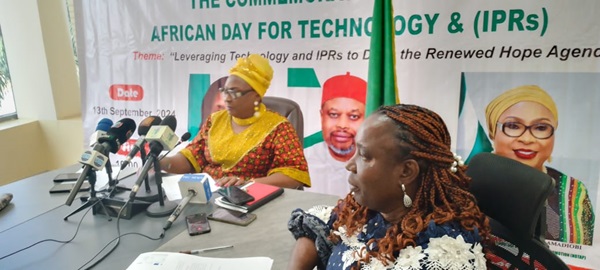
As Nigeria commemorates the 2024 African Day for Technology and Intellectual Property Rights (ADTIPR2024), the Federal Government has reaffirmed its commitment to supporting indigenous inventors and innovators in a bid to spur national development.
The director-general of the National Office for Technology Acquisition and Promotion (NOTAP), Obiageli Amadiobi made this known during a media briefing to mark the occasion, themed “Leveraging Technology and IPRs to Drive the Renewed Hope Agenda,” in Abuja.
“I wish to affirm our commitment to guiding the process of technology transfer and promoting intellectual property rights (IPRs) to support indigenous inventors and innovators,” Amadiobi said. “This will drive progress and harness the benefits of innovation and creativity, contributing to Nigeria’s development and building a greater future for all.”
September 13 was designated by the African Union Council of Ministers and Assembly of Heads of State and Governments in July 1999 in Addis Ababa, Ethiopia, as the African Day for Technology and Intellectual Property Rights. The day was created to raise awareness and promote the domestication of technology and the development of the IPR system in African member states. Its goal is to reawaken the creative ability of Africans to develop solutions to the continent’s challenges, with the aim of eradicating poverty and driving sustainable development.
Speaking about Nigeria’s involvement, Amadiobi explained that since 2000, NOTAP has consistently coordinated activities to commemorate the day on behalf of the Nigerian government. These activities include organising seminars, symposiums, press briefings, sensitisation workshops, technology exhibitions, and other initiatives with strategic partners in the science, technology and innovation (STI) ecosystem, as well as regional bodies.
“The Nigerian government, through NOTAP and the Federal Ministry of Innovation, Science and Technology, has demonstrated its determination to promote indigenous technologies. This is done by encouraging entrepreneurs, researchers and inventors in the protection of their intellectual property, while streamlining the process for acquiring foreign technology,” she said. “I want to state that the ministry, through all its agencies like NOTAP, is working assiduously in collaboration with other stakeholders to create policies that motivate inventiveness, ensuring the rapid technological development of our country.”
Amadiobi further explained that the commemoration of ADTIPR seeks, among other objectives, to ignite the latent creativity and inventive spirit of young inventors and innovators, aiming to spur the development of indigenous solutions.
Highlighting some of NOTAP’s achievements in intellectual property development, Amadiobi said the agency has established over 65 intellectual property and technology transfer offices (IPTTOs) across Nigeria. It has processed over 1,000 patent applications, which were submitted to the Nigerian Patent and Design Registry (NPDR), and assisted researchers at no cost in acquiring over 300 patent certificates from NPDR. Out of these, 70 patents have been commercialised in the Nigerian market, with five gaining international market access. Additionally, NOTAP launched and distributed guidelines for the commercialisation of research and development (R&D) results in Nigeria.
As part of activities to commemorate the day, NOTAP plans to hold exhibitions and stakeholder engagements with key players in technology and intellectual property rights. These activities aim to further underline the importance of the initiative.
“In conclusion, as we celebrate the African Day for Technology and Intellectual Property Rights, I urge all stakeholders in the STI ecosystem to reflect on the adopted theme,” Amadiobi said. “This will enable collaborations that foster Nigeria’s STI commercialisation and national development. I believe that no single agency can succeed without deliberate and conscious collaboration to achieve synergistic results.”
Amadiobi also advocated for a more robust intellectual property system, emphasising the importance of harnessing Nigeria’s abundant research output from academic and research institutions. “By strengthening the IP system, we can ensure that research works are fully exploited for the benefit of our society,” she added.


